International Law and Treaties
Rule of Law Among Nations
- General debate speech at the UN General Assembly by Prime Minister Kishida (September 2022)
- Open Debate of the UN Security Council on the "Rule of Law among Nations" hosted by Foreign Minister Hayashi (January 2023)
- G7 Japan 2023 Foreign Ministers’ Meeting (Karuizawa, Nagano) (April 2023)
- G7 Hiroshima Summit (May 2023)
- Foreign Minister Kamikawa’s Visit to The Hague, the Netherlands (January 2024)
- Japan’s Statements regarding the request for advisory opinion of the International Court of Justice – “Legal Consequences arising from the Policies and Practices of Israel in the Occupied Palestinian Territory, including East Jerusalem” (July 2023, February 2024)
- Friendly Relations Declaration
- Japan’s Statements regarding the request for advisory opinion of the International Court of Justice – “Obligations of States in Respect of Climate Change”
General debate speech at the UN General Assembly by Prime Minister Kishida (September 2022)
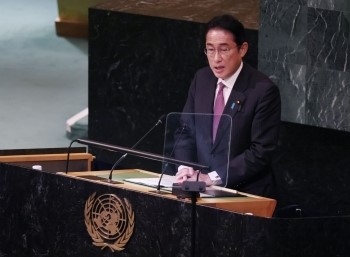 Prime Minister Kishida delivers a general debate speech at the UN General Assembly
(Photo: Cabinet Public Affairs Office)
Prime Minister Kishida delivers a general debate speech at the UN General Assembly
(Photo: Cabinet Public Affairs Office)
On September 20, 2022, Prime Minister Kishida stated at the 77th Session of the United Nations General Assembly that Japan is fully committed to the realization of a United Nations that promotes the rule of law in the international community. In his statement, he made the following three points:
- Break away from “rule by force” and pursue “rule of law” through observing international law in good faith;
- Do not allow any attempts to change the status quo of territories and areas by force or coercion; and
- Cooperate with one another against serious violations of the principles of the UN Charter
Open Debate of the UN Security Council on the "Rule of Law among Nations" hosted by Foreign Minister Hayashi (January 2023)
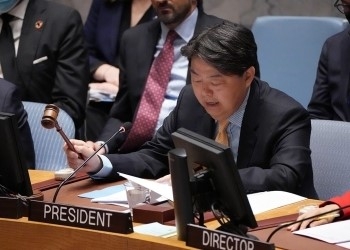
On January 12, 2023, Foreign Minister Hayashi stated at the open debate of the UN Security Council on the theme of “Rule of Law among Nations" (PDF) ; that the rule of law among nations is about returning to the unshakable principles that the Member States have built upon since 1945, and called upon all Member States "Uniting for the rule of law" . (See also the concept note for the open debate (PDF)
; that the rule of law among nations is about returning to the unshakable principles that the Member States have built upon since 1945, and called upon all Member States "Uniting for the rule of law" . (See also the concept note for the open debate (PDF) )
)
G7 Japan 2023 Foreign Ministers’ Meeting (Karuizawa, Nagano) (April 2023)
On April 18, 2023, G7 Foreign Ministers met in Karuizawa, Japan, and issued Communique (PDF) containing the following paragraph relating to the rule of law among nations:
containing the following paragraph relating to the rule of law among nations:
“The prohibition of threats or the use of force against the territorial integrity or political independence of any state, in accordance with the provisions of the UN Charter, constitutes the cornerstone of the post-war international system. Yet, territorial ambition is again driving some states to return to rule by force, so we have redoubled our efforts to uphold peace guided by the rule of law. The prohibition on the acquisition of territory resulting from the threat or use of force, reaffirmed in the Friendly Relations Declaration of 1970, should be observed in good faith. We strongly oppose any unilateral attempts to change the peacefully established status of territories by force or coercion anywhere in the world. In this regard, sending regular or irregular forces to unilaterally annex a territory is prohibited.
G7 Hiroshima Summit (May 2023)
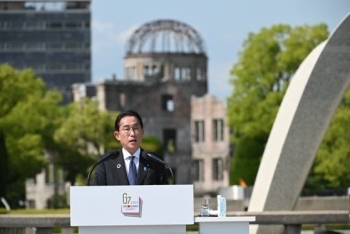 Prime Minister Kishida held a Presidency Press Conference at the G7 summit in Hiroshima (Photo: Cabinet Public Affairs Office)
Prime Minister Kishida held a Presidency Press Conference at the G7 summit in Hiroshima (Photo: Cabinet Public Affairs Office)
G7 Hiroshima Leaders’ Communiqué
On May 20, 2023, G7 Leaders met in Hiroshima, Japan, and issued Communique (PDF)  containing the following paragraphs relating to the rule of law among nations:
containing the following paragraphs relating to the rule of law among nations:
“We will champion international principles and shared values by:
- upholding and reinforcing the free and open international order based on the rule of law, respecting the UN Charter to the benefit of countries, large and small;
- strongly opposing any unilateral attempts to change the peacefully established status of territories by force or coercion anywhere in the world and reaffirming that the acquisition of territory by force is prohibited;”
G7 Hiroshima Summit Session 9 "Toward a Peaceful, Stable and Prosperous World"
On May 21, 2023, the G7 Hiroshima Summit Session 9 “Toward a Peaceful, Stable and Prosperous World” was held. The G7 leaders along with the leaders of 8 invited countries and Ukraine’s President Volodymyr Zelenskyy, who attended as a guest, discussed how to respond to the challenges to peace and stability.
The leaders had a discussion on various challenges to peace and stability that the international community is facing, including in the Indo-Pacific and Africa, and shared the recognition that the following points are important:
- “All countries should adhere to the principles of the United Nations (UN) Charter, including respect for sovereignty and territorial integrity.
- Confrontation should be resolved peacefully through dialogue, and we support a just and durable peace that is based on respect for international law and the principles of the UN Charter.
- Any unilateral attempt to change the status quo by force is unacceptable anywhere in the world.
- We strive to uphold the free and open international order based on the rule of law.”
[Note] 8 invited countries are Australia, Brazil, Comoros (African Union Chair), Cook Island (Pacific Islands Forum (PIF) Chair), India (G20 Presidency), Indonesia (ASEAN Chair), Republic of Korea and Vietnam.
Foreign Minister Kamikawa’s Visit to The Hague, the Netherlands (January 2024)
Foreign Minister Kamikawa of Japan, visited the International Court of Justice (ICJ) and the International Criminal Court (ICC) located in The Hague, the Netherlands on January 11, 2024. She also visited the International Tribunal for the Law of the Sea (ITLOS) located in Hamburg, Germany on January 15, 2024 . The overview of the results of the visits are as follows:
- Minister Kamikawa conveyed to the Presidents of the Courts Japan's unwavering support for the role played by international courts in upholding the "rule of law" and "human dignity". They confirmed to further strengthen their cooperation.
- Given the reality of the international community where peace and security are threatened due to the fragility of the “rule of law”, Minster Kamikawa expressed Japan’s commitment to promoting the following three pillars as a package to strengthen the “rule of law” by utilizing Japan's strengths.
- Efforts to promote the rule of law at the international level, in particular through the enhancement of the role of international courts, such as by calling on other states to make a declaration of acceptance of the compulsory jurisdiction of the ICJ as well as to conclude the Rome Statute of the ICC.
- Efforts to promote the “rule of law” within a country, such as support for the development of legal systems in Asia and Africa and support for female victims in conflict situations in Africa through the ICC Trust Fund for Victims.
- Fostering of international legal human resources to support the “rule of law” both at the international and national levels (ex. training programs through JICA/UNAFEI and the Tokyo International Law Seminar) and increase in the number of Japanese personnel at international courts and international organizations.
Minister Kamikawa stated that Japan will comprehensively pursue diplomacy for strengthening the “rule of law” in the international community based on dialogue and cooperation, on the basis of the results of these visits.
For a transcript of the press conference held on the occasion of the visit, see below.
Japan’s Statements regarding the request for advisory opinion of the International Court of Justice – “Legal Consequences arising from the Policies and Practices of Israel in the Occupied Palestinian Territory, including East Jerusalem” (July 2023, February 2024)
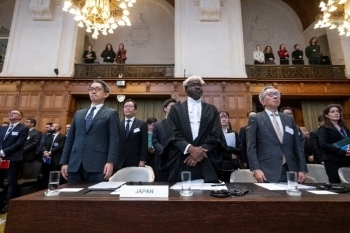 Japanese delegation at the oral proceedings(Photo:International Court of Justice)
Japanese delegation at the oral proceedings(Photo:International Court of Justice)
With regard to the request for advisory opinion submitted by the General Assembly of the United Nations for the International Court of Justice on “Legal Consequences arising from the Policies and Practices of Israel in the Occupied Palestinian Territory, including East Jerusalem”, Japan submitted its written statement(PDF) on July 2023 and participated in the public sitting to deliver its oral statement on 22 February 2024(PDF)
on July 2023 and participated in the public sitting to deliver its oral statement on 22 February 2024(PDF) .
.
In its statements, reiterating its basic position on the Middle East Peace Process, Japan took the opportunity to present its views on legal aspects regarding the principle of the “prohibition of the acquisition of territory by force”, an important element of the rule of law in the international community.
By continuing its contribution to the activities in the ICJ, including its participation in this oral proceedings, Japan will actively engage in the efforts to promote the rule of law in the international community.
Friendly Relations Declaration
“The rule of law among nations” is a term used in the preamble of the Friendly Relations Declaration (GA res 2625 (XXV) “Declaration on Principles of International Law concerning Friendly Relations and Co-operation among States in accordance with the Charter of the United Nations”, 1970). Some of the relevant parts of the Declaration are as follows:
The General Assembly,
Reaffirming in the terms of the Charter of the United Nations that the maintenance of international peace and security and the development of friendly relations and co-operation between nations are among the fundamental purposes of the United Nations, (…)
Bearing in mind also the paramount importance of the Charter of the United Nations in the promotion of the rule of law among nations, (…)
Considering that the faithful observance of the principles of international law concerning friendly relations and co-operation among States and the fulfillment in good faith of the obligations assumed by States, in accordance with the Charter, is of the greatest importance for the maintenance of international peace and security and for the implementation of the other purposes of the United Nations, (…)
- Solemnly proclaims the following principles:
Every State has the duty to refrain in its international relations from the threat or use of force against the territorial integrity or political independence of any State, or in any other manner inconsistent with the purposes of the United Nations. Such a threat or use of force constitutes a violation of international law and the Charter of the United Nations and shall never be employed as a means of settling international issues. (…)
Every State has the duty to refrain from the threat or use of force to violate the existing international boundaries of another State or as a means of solving international disputes, including territorial disputes and problems concerning frontiers of States. (…)
The territory of a State shall not be the object of military occupation resulting from the use of force in contravention of the provisions of the Charter. The territory of a State shall not be the object of acquisition by another State resulting from the threat or use of force. No territorial acquisition resulting from the threat or use of force shall be recognized as legal. (…)
The duty of States to co-operate with one another in accordance with the Charter
States have the duty to co-operate with one another, irrespective of the differences in their political, economic and social systems, in the various spheres of international relations, in order to maintain international peace and security and to promote international economic stability and progress, the general welfare of nations and international co-operation free from discrimination based on such differences.
To this end:
- States shall co-operate with other States in the maintenance of international peace and security; (…)
The principle that States shall fulfil in good faith the obligations assumed by them in accordance with the Charter
Every State has the duty to fulfil in good faith the obligations assumed by it in accordance with the Charter of the United Nations.
Every State has the duty to fulfil in good faith its obligations under the generally recognized principles and rules of international law.
Every State has the duty to fulfil in good faith its obligations under international agreements valid under the generally recognized principles and rules of international law. (…)
Japan’s Statements regarding the request for advisory opinion of the International Court of Justice – “Obligations of States in Respect of Climate Change”
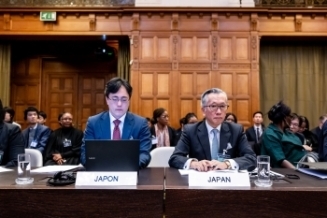
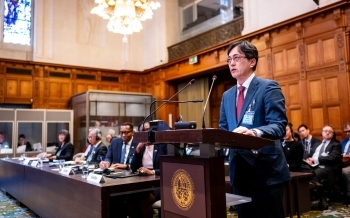
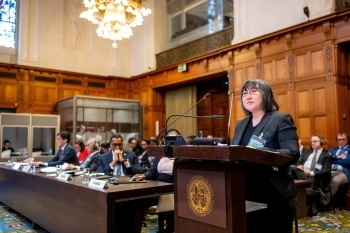
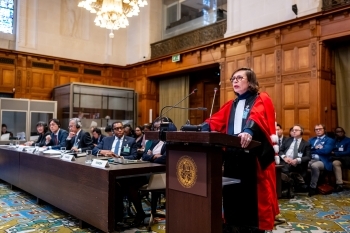
Japanese delegation at the oral proceedings (Photo: International Court of Justice)
With regard to the request for advisory opinion submitted by the General Assembly of the United Nations for the International Court of Justice on “Obligations of States in Respect of Climate Change”, Japan submitted its written statement (PDF)  on March 2024 and participated in the public sitting to deliver its oral statement on 9 December 2024 (PDF)
on March 2024 and participated in the public sitting to deliver its oral statement on 9 December 2024 (PDF)  .
.
In its statements, reiterating its basic position on climate change measures, Japan took the opportunity to present its views on obligations and legal consequences under international law in the field of climate change.
By continuing its contribution to the activities in the ICJ, including its participation in this oral proceedings, Japan will actively engage in the efforts to promote the rule of law in the international community and take action to address the issue of climate change, which is an urgent challenge common to all humankind.

